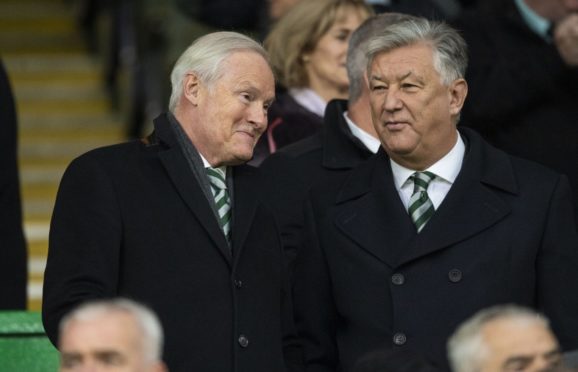
David Low played a key role the last time Celtic fans rebelled against their board.
He was Fergus McCann’s financial adviser in 1994 when the expat businessman bought the club from the Whites, Kelly and Grants while supporters boycotted matches.
The club was hours away from being shut down by the Bank of Scotland when McCann and his consortium stepped in to clear their debts.
Low, now chairman of the shareholders’ organisation, The Celtic Trust, claims that relations between the fans and the club’s directors are as bad now as they were 26 years ago.
And he believes that more then chief executive Peter Lawwell – who resigned on Friday – will need to go if the club is to collect their anxiously awaited season-ticket renewal money.
“Four of the five non-executive directors – Ian Bankier, Tom Allison, Brian Wilson and Dermot Desmond – who, as major shareholder, is in a different category to the others – have been there for more than nine years,” said Low.
“That is at odds with best practise in terms of corporate governance, although it’s not unlawful.
“The job of non-executive directors is to question and assess the executive management, determine whether that is the best management, and how much money they should be paid.
“Ultimately, Celtic’s executive directors are paid an awful lot of money for a company of that size while, in financial terms, the share price hasn’t been as high as it was in 1999 when Fergus sold his holding.
“You can use that, or the footballing department this season, to monitor their Key Performance Indicators.
“But they seem to be focussing on their achievements prior to the collapse of the team to justify everything.
“I think it’s all been stale, and it reminds me of the old board in terms of the sense of entitlement and their remoteness from the fans.
“There’s no financial comparison with 1994. But, in terms of their attitude to the fans, and their communications and relationship with them, there are a lot of similarities.
“The supporters are entitled to criticise them, and to ask for changes.
“We are the customers, and we effectively pay their wages. So they can’t argue with that, even though they might not like it.”
Low won’t encourage fans to starve the club of cash, but believes it will happen if there isn’t a major boardroom shake-up.
“What I will say is that the Celtic Trust will have nothing to do with boycotts, or refusing to buy season tickets,” he said.
“But Celtic’s six-monthly interim figures are due to be published in the first two weeks of February and, like every other football club’s, they won’t make for good reading.
“Consequently, I believe the odds are decent that there will be changes in the boardroom because Celtic know that very soon they’ll need to start selling season tickets again, and they know that there’s rebellion in the air.
“They realise there has to be a change in the dynamic in order to encourage fans to buy tickets for games they may not be allowed into the stadium to watch.”
The Celtic Trust wants fans who bought shares – but have lost them due to deaths in the family or moving house – to contact them at Trust@celtictrust.net, so they can be reunited with them, and have a say in the running of their club.
Low said: “This counts for around 10% of the shareholding, and concentrates the power of other shareholders.”

Enjoy the convenience of having The Sunday Post delivered as a digital ePaper straight to your smartphone, tablet or computer.
Subscribe for only £5.49 a month and enjoy all the benefits of the printed paper as a digital replica.
Subscribe